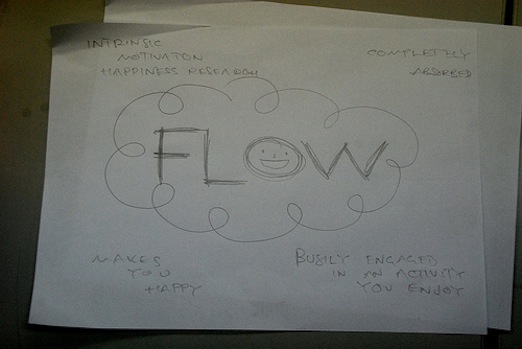What Does It Mean to Find “Flow”?
 In 1975, psychologist Mihaly Csikszentmihalyi interviewed so called “experts” in their field. These represented artists, athletes, musicians, chess masters and surgeons.
In 1975, psychologist Mihaly Csikszentmihalyi interviewed so called “experts” in their field. These represented artists, athletes, musicians, chess masters and surgeons.
Csikszentmihalyi wanted to study what he called the “optimal experience.” He wanted to investigate how people felt when they most enjoyed themselves and why. So he interviewed these experts because these were people who spent their time in the activity they preferred.
From their accounts of what it felt like to do what they loved and be engaged in it, he identified a path to happiness that entailed being highly engaged in an activity. He called this a state of flow.
Csikszentmihalyi has identified the following eight components that describe the state of flow:
- Clear Goal - Knowing what you want to do in any given moment is a key element of the flow experience.
- Feedback - You need to be able to tell if you are getting closer to your goal or not.
- Challenges Match Skills - It is important that what you do matches your ability to do it.
- Concentration - Total attention onto one task.
- Focus- Focus on only one task.
- Control - When you are in flow you feel that you can be in control of your actions and experience.
- Loss of Self-Consciousness - There is no room for relentless self-monitoring.
- Transformation of Time - Time seems to adapt itself to your individual experience.
Flow is described as the perfect balance between boredom and anxiety and as your skills develop in the activity, the difficulty of the activity needs to increase.
Thus, flow is about cultivating an activity.
There are three conditions that are necessary to achieve the state of flow:
- You must be involved in an activity with clear goals, which brings direction and structure to the task.
- You must have a good balance between the perceived challenges of the task and your own perceived skills in order to be confident that you possess the capabilities to accomplish the difficult task.
- The task must have lucid and immediate feedback so that you can adjust your actions in order to meet the demands of the task to maintain the state of flow.
Are you achieving flow at work?
Do your daily projects provide a right balance of interest and difficulty?
Reference:
Csiksentmihalyi, M. (1990). Flow: The psychology of optimal experience. New York: Harper & Row.
Photo Credit: Flickr/Jordanhill School D&T Dept
